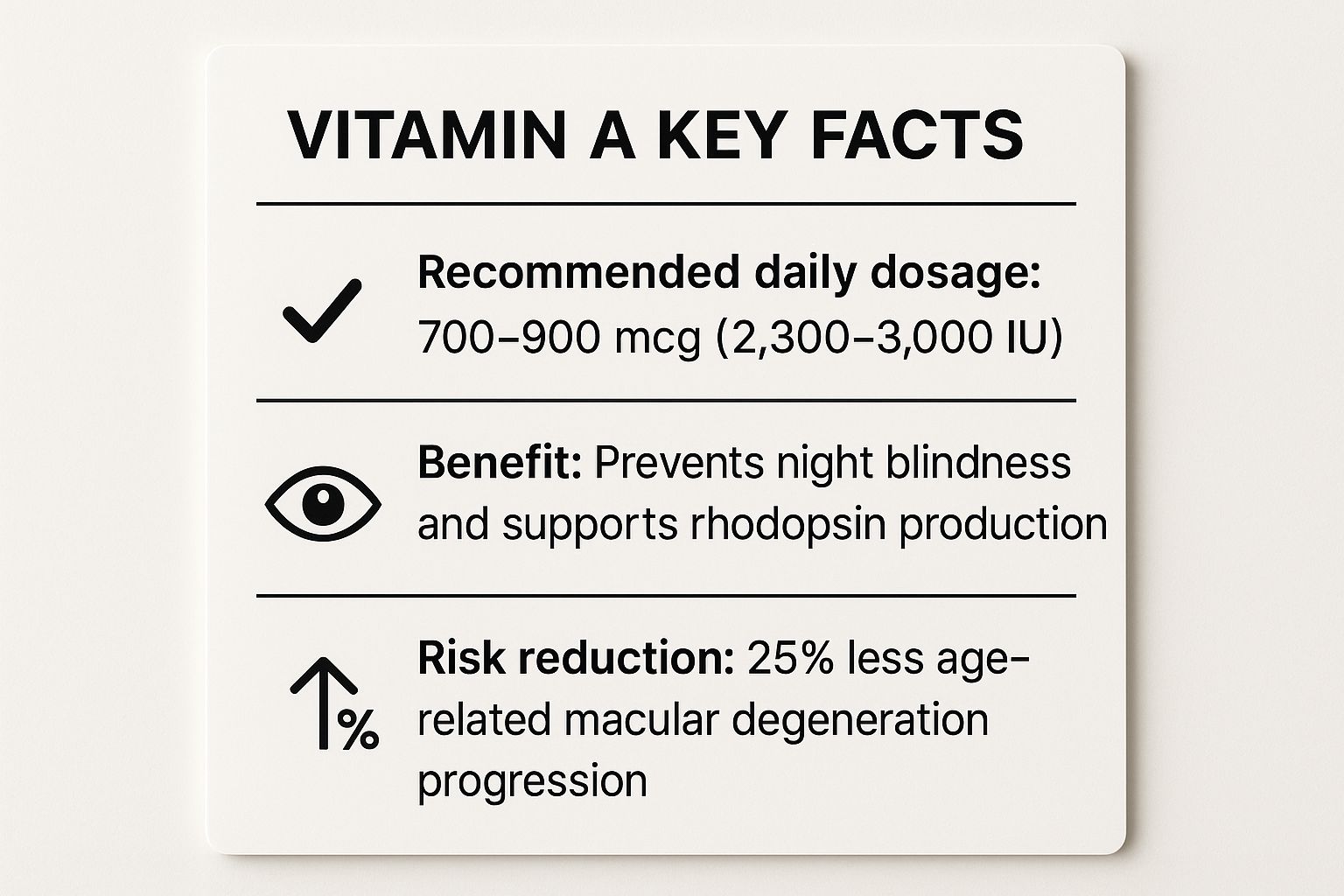
7 Essential Vitamins for Eye Health in 2025
In our visually-driven world, safeguarding our eyesight has never been more critical. We're constantly demanding more from our eyes, from endless screen time to navigating brightly lit environments. While the old adage about carrots improving vision holds a kernel of truth, the science of ocular nutrition is far more complex and fascinating. The right combination of vitamins for eye health is crucial for maintaining clear vision and preventing long-term damage.
This guide moves beyond the basics to provide a comprehensive roundup of the most impactful nutrients for your eyes. It involves a specific orchestra of compounds working in harmony to protect delicate retinal tissues, filter harmful light, and combat the oxidative stress that leads to age-related decline. We'll explore not just what you need, but why it works, how much to aim for, and the best food sources to find it.
While our focus is on specific vitamins for visual health, it's worth remembering that eye health is an integral part of your broader holistic well-being, encompassing mind, body, and soul. Prepare to see your eye care routine in a whole new light.
1. Vitamin A (Retinol)
Vitamin A is a cornerstone nutrient for vision and one of the most essential vitamins for eye health. This fat-soluble vitamin plays a critical role in maintaining a clear cornea, the outside covering of your eye. Its most famous function, however, is its part in producing rhodopsin. Rhodopsin is a photopigment protein in your retina that allows your eyes to see in low-light conditions, making it indispensable for night vision.
A deficiency in Vitamin A can lead to serious eye conditions, most notably xerophthalmia, a progressive disease that begins with night blindness and can ultimately cause total blindness if left untreated. This is why organizations like the World Health Organization have implemented global programs to combat Vitamin A deficiency, especially in developing nations where it is a leading cause of preventable blindness in children.
How Vitamin A Supports Your Vision
Vitamin A supports the eye in several key ways:
- Rhodopsin Production: It is a vital component of the rhodopsin molecule, which absorbs light in the retinal receptors. Without it, your ability to see in dim light is severely compromised.
- Corneal Health: It helps maintain the integrity of the cornea and conjunctiva, the mucous membranes that line the surface of your eye and eyelids, protecting them from damage and infection.
- Reduced AMD Risk: Significant research, including the Age-Related Eye Disease Study (AREDS), has demonstrated its role in protecting against age-related macular degeneration (AMD). The study found that a specific supplement formulation including Vitamin A (as beta-carotene) reduced the risk of advanced AMD progression by approximately 25% in high-risk individuals.
The following summary box highlights the most important facts about incorporating Vitamin A for better eye health.

These key takeaways show how a proper intake of Vitamin A not only prevents deficiency-related issues like night blindness but also actively helps reduce the risk of serious age-related eye diseases.
Actionable Tips for Vitamin A Intake
To ensure you get the full benefits of Vitamin A, consider these practical tips:
- Take with Fat: As a fat-soluble vitamin, Vitamin A is best absorbed when consumed with a meal containing healthy fats like avocado, nuts, or olive oil.
- Know Your Sources: You can get Vitamin A in two primary forms. Preformed Vitamin A (retinol) is found in animal products like liver, fish oils, and dairy. Pro-vitamin A (carotenoids, like beta-carotene) is found in colorful fruits and vegetables such as carrots, sweet potatoes, and spinach. To delve deeper into the specific forms of Vitamin A, you can find more information on Retinyl Acetate Vitamin A.
- Supplement Safely: While supplements are effective, high doses of preformed Vitamin A can be toxic. Do not exceed 10,000 IU (3,000 mcg) daily without consulting a healthcare professional, especially if you are pregnant or planning to become pregnant.
Maintaining optimal Vitamin A levels is a fundamental step in a comprehensive eye care routine. To better understand your current vision status, you can learn more about how healthy your eyes are at spektrumglasses.com.
2. Lutein
Often called 'the eye vitamin', Lutein is a powerful carotenoid that functions as a natural filter for high-energy blue light, protecting the delicate tissues in your eye from potential damage. It is a key antioxidant that accumulates in the macula, the central part of your retina responsible for sharp, detailed central vision. As one of the most crucial vitamins for eye health, Lutein's primary role is to shield your eyes from oxidative stress, particularly from sunlight and digital screens.

Unlike other vitamins, the human body cannot produce Lutein on its own, making dietary intake or supplementation essential. Its protective benefits are especially noted in the context of modern lifestyles, where prolonged exposure to digital devices is common. This makes Lutein not just a nutrient for preventing age-related decline but a daily defense mechanism for your vision.
How Lutein Supports Your Vision
Lutein provides targeted support for the macula and retina in several specific ways:
- Blue Light Filtration: It absorbs harmful, high-energy blue light wavelengths, acting like internal sunglasses to prevent them from reaching and damaging the underlying photoreceptor cells in the retina.
- Antioxidant Defense: Lutein neutralizes unstable molecules known as free radicals, which can cause oxidative damage to eye cells. This protection is critical for maintaining long-term macular health.
- Reduced AMD Risk: The landmark Age-Related Eye Disease Study 2 (AREDS2) found that a daily supplement of 10 mg of Lutein (along with zeaxanthin) reduced the risk of progression to advanced age-related macular degeneration (AMD) by up to 25% in at-risk individuals.
- Less Eye Strain: Research indicates that Lutein supplementation can significantly reduce digital eye strain. One study showed computer workers experienced a 30% reduction in symptoms like eye fatigue and headaches after taking Lutein.
Actionable Tips for Lutein Intake
To effectively incorporate Lutein into your eye health regimen, follow these practical tips:
- Take with Fat: Like other carotenoids, Lutein is fat-soluble. Consuming it with a meal that includes healthy fats, such as olive oil, nuts, or avocado, will significantly boost its absorption.
- Combine with Zeaxanthin: Lutein works synergistically with another carotenoid, zeaxanthin. For maximum benefit, look for supplements that provide both, often in a 5:1 ratio (e.g., 10 mg Lutein to 2 mg zeaxanthin).
- Be Patient for Results: The benefits of Lutein build up over time as it accumulates in the macula. It may take three to six months of consistent daily intake to notice improvements in eye comfort and visual performance.
- Choose Quality Supplements: For proven efficacy, opt for supplements containing well-researched, trademarked forms like FloraGLO® Lutein, which has been extensively studied and is used in major clinical trials like AREDS2. Reputable brands like Bausch + Lomb and Doctor's Best often utilize this form.
3. Zeaxanthin
Zeaxanthin is a powerful antioxidant carotenoid and one of the most critical vitamins for eye health, working in close partnership with lutein. This nutrient is highly concentrated in the macula, which is the central part of the retina responsible for sharp, detailed central vision. Zeaxanthin and lutein together form the macular pigment, a protective layer that acts like internal sunglasses for your eyes.

The primary role of this macular pigment is to shield the delicate photoreceptor cells in the retina from oxidative damage caused by high-energy blue light and free radicals. A dense macular pigment is directly linked to better visual performance and a lower risk of developing chronic eye diseases, particularly age-related macular degeneration (AMD).
How Zeaxanthin Supports Your Vision
Zeaxanthin provides targeted protection for the most vital part of your retina in several ways:
- Blue Light Filtration: It absorbs harmful blue and ultraviolet (UV) light, preventing it from reaching and damaging the sensitive structures at the back of the eye.
- Glare Reduction & Contrast Sensitivity: A healthy macular pigment improves visual acuity by reducing glare and enhancing contrast sensitivity. Studies have shown pilots taking zeaxanthin experienced reduced glare from cockpit instruments, and elderly patients reported improved vision in low-contrast situations.
- Antioxidant Defense: Zeaxanthin neutralizes unstable free radicals generated by light and oxygen exposure, protecting retinal cells from the oxidative stress that contributes to AMD and cataracts. Research has demonstrated that daily supplementation can significantly improve visual function.
The following summary box highlights the most important facts about incorporating Zeaxanthin for better eye health.
Key Takeaways for Zeaxanthin
- Primary Role: Forms the macular pigment to filter blue light and protect the central retina.
- Key Benefit: Reduces the risk of age-related macular degeneration (AMD) and improves visual performance, including glare reduction and contrast sensitivity.
- Scientific Backing: Numerous studies, including those by organizations like the Life Extension Foundation, confirm its efficacy in enhancing macular pigment optical density (MPOD) and supporting vision.
These key takeaways show how maintaining adequate zeaxanthin levels is essential not just for long-term disease prevention but also for improving day-to-day visual quality.
Actionable Tips for Zeaxanthin Intake
To ensure you get the full benefits of zeaxanthin, consider these practical tips:
- Take with Meals: Like other carotenoids, zeaxanthin is fat-soluble. Consuming it with a meal that contains healthy fats, such as olive oil or avocado, will significantly boost its absorption.
- Pair with Lutein: Zeaxanthin and lutein work synergistically. Most research-backed supplements, like those from Thorne Health, provide a combination, with a common effective dose being 2-4 mg of zeaxanthin daily.
- Look for Meso-Zeaxanthin: For enhanced benefits, look for premium formulas that include meso-zeaxanthin. This isomer is created in the retina from lutein and is highly concentrated at the very center of the macula, offering potent protection.
- Eat Your Greens and Yellows: Boost your dietary intake by eating foods rich in zeaxanthin, such as corn, paprika, saffron, goji berries, and orange bell peppers. Leafy greens like spinach and kale are also excellent sources.
4. Vitamin C (Ascorbic Acid)
Vitamin C is a powerful water-soluble antioxidant and one of the most crucial vitamins for eye health. The eye actually contains some of the highest concentrations of Vitamin C found anywhere in the body, particularly in the aqueous humor and the lens. This potent nutrient helps protect against oxidative damage caused by UV light and supports the health of delicate blood vessels in the retina.
Its role as an antioxidant is vital for maintaining transparency in the eye's lens. A deficiency or low intake of Vitamin C has been linked to an increased risk of developing cataracts, a condition where the lens becomes cloudy. Furthermore, by supporting collagen production, Vitamin C helps maintain the structure of the cornea and sclera, the white part of your eye.
How Vitamin C Supports Your Vision
Vitamin C contributes to eye health through several essential functions:
- Cataract Prevention: As a powerful antioxidant, Vitamin C neutralizes free radicals that can damage proteins in the lens, which leads to cataract formation. Studies, such as the prominent Nurses' Health Study, found that women who used Vitamin C supplements for 10 years or more had a significantly lower risk of developing cataracts.
- Blood Vessel Health: It is essential for producing collagen, a protein that provides structure to your entire body, including the tiny capillaries in your retina. Healthy blood vessels ensure a steady supply of oxygen and nutrients to the eye. This is especially important for individuals with diabetes, as some research shows it may help reduce retinal damage.
- Reduced AMD Risk: Similar to other antioxidants, Vitamin C plays a role in slowing the progression of age-related macular degeneration (AMD). The AREDS and AREDS2 studies included Vitamin C in their antioxidant formula, which was shown to reduce the risk of advanced AMD progression in at-risk individuals.
Actionable Tips for Vitamin C Intake
To maximize the eye-protective benefits of Vitamin C, follow these practical recommendations:
- Divide Your Doses: Since Vitamin C is water-soluble, your body doesn't store it. For optimal absorption and to maintain steady levels, take supplements in divided doses throughout the day, such as 500 mg in the morning and 500 mg in the evening.
- Choose Buffered Forms: High doses of ascorbic acid can cause stomach upset in some people. If you have a sensitive stomach, consider a buffered form of Vitamin C, such as calcium ascorbate, which is gentler on the digestive system.
- Enhance with Bioflavonoids: Take Vitamin C with bioflavonoids, which are compounds found in citrus fruits. They work synergistically to enhance the absorption and antioxidant power of Vitamin C.
- Prioritize Food Sources: While supplements are effective, aim to get Vitamin C from a diet rich in fruits and vegetables like citrus fruits, bell peppers, strawberries, broccoli, and kiwi.
Incorporating sufficient Vitamin C into your diet is a key strategy for long-term vision protection. You can explore additional information on ways to maintain good eye health at spektrumglasses.com.
5. Vitamin E (Tocopherols)
Vitamin E is a powerful, fat-soluble antioxidant that stands as a key defender of your eye's delicate cells. As one of the most important vitamins for eye health, its primary role is to protect cell membranes throughout the body from damage caused by free radicals, which are unstable molecules that contribute to aging and disease. In the eye, this protective action is especially critical for maintaining the health of the retina and lens.
A significant body of research highlights Vitamin E's synergistic relationship with other antioxidants, like Vitamin C, in combating oxidative stress. This collaborative effort helps safeguard your eyes against the cumulative damage that can lead to common age-related vision problems. Insufficient intake can leave the eyes more vulnerable to this oxidative damage over time.
How Vitamin E Supports Your Vision
Vitamin E contributes to long-term eye health in several crucial ways:
- Protection Against Oxidative Stress: It neutralizes free radicals, preventing them from damaging the fatty acids within retinal cell membranes. This is vital for preserving the structure and function of your photoreceptor cells.
- Reduced AMD Risk: The landmark Age-Related Eye Disease Study (AREDS) confirmed Vitamin E's value. The study showed that a daily dose of 400 IU of Vitamin E, as part of a specific antioxidant formula, significantly slowed the progression of age-related macular degeneration (AMD) in individuals already at high risk.
- Cataract Prevention: Multiple population studies have linked higher dietary intake and supplementation of Vitamin E with a reduced risk of developing certain types of cataracts. Its antioxidant properties are believed to protect the proteins in the lens from the oxidative damage that causes them to clump together and form cloudy spots.
Vitamin E’s role as a cellular protector is essential for preserving clear, sharp vision as you age, making it an indispensable part of a proactive eye care regimen.
Actionable Tips for Vitamin E Intake
To effectively incorporate Vitamin E into your routine for better eye health, follow these practical tips:
- Take with Meals: Like Vitamin A, Vitamin E is fat-soluble. Consuming it with a meal that contains healthy fats, such as nuts, seeds, or avocado, will significantly improve its absorption.
- Choose the Right Form: Look for supplements containing natural Vitamin E, listed as "d-alpha tocopherol." This form is more biologically active than its synthetic counterpart, "dl-alpha tocopherol." Many popular brands like Bausch + Lomb (in their AREDS formulas), Solgar, and NOW Foods offer this natural form.
- Supplement with Caution: The standard dose used in studies for eye health is 400 IU daily. However, high doses of Vitamin E can act as a blood thinner, so it's crucial to consult your doctor before supplementing, especially if you are taking anticoagulant medications like warfarin.
- Store Properly: Protect your Vitamin E supplements from heat, light, and air to prevent them from oxidizing and losing their potency. A cool, dark place is the ideal storage location.
6. Zinc
Zinc is a powerful “helper” mineral that plays a massive supportive role among the essential vitamins for eye health. This vital trace mineral is highly concentrated in the eye, especially within the retina and the macula. Its primary function is to act as a transport vehicle for Vitamin A, helping to move it from the liver to the retina to produce melanin, a protective pigment that shields our eyes from damaging UV light.
Without adequate zinc, Vitamin A cannot be effectively utilized, which can compromise vision. A zinc deficiency can lead to issues similar to those from a Vitamin A deficiency, including poor night vision and, in severe cases, cataracts. Its importance is highlighted by the high concentration found in healthy retinal tissue, indicating its critical role in maintaining eye structure and function.
How Zinc Supports Your Vision
Zinc contributes to long-term eye health in several crucial ways:
- Enzyme Function: It is a key component of many vital enzymes, including superoxide dismutase, which acts as a powerful antioxidant, protecting eye cells from free radical damage.
- Vitamin A Metabolism: Zinc is indispensable for enabling Vitamin A to create melanin. This pigment not only protects the eye but also helps sharpen vision. Studies have shown improved night vision in individuals with zinc deficiencies after supplementation.
- Reduced AMD Risk: The landmark Age-Related Eye Disease Study (AREDS), sponsored by the National Eye Institute, found that a daily supplement containing 80 mg of zinc oxide, along with other antioxidants, reduced the risk of advanced age-related macular degeneration (AMD) progression by about 25% and visual acuity loss by 19% in high-risk individuals.
These key points demonstrate that zinc is not just a background player; it is an active and necessary component for protecting your vision, particularly as you age.
Actionable Tips for Zinc Intake
To ensure you get the full protective benefits of zinc, consider these practical tips:
- Supplement with Copper: Taking high doses of zinc (40-80 mg daily) can interfere with copper absorption and lead to a deficiency. To prevent this, it's recommended to supplement with 2 mg of copper for every 40-80 mg of zinc.
- Choose the Right Form: Zinc oxide or zinc gluconate are commonly used in studies and are well-absorbed. Always take zinc supplements with food to avoid potential stomach upset.
- Time Your Intake: Avoid taking zinc at the same time as calcium or iron supplements, as they can compete for absorption in the body, reducing its effectiveness.
- Focus on Food Sources: Incorporate zinc-rich foods into your diet, such as oysters, red meat, poultry, beans, nuts, and whole grains. To discover more vision-boosting foods, you can explore these great foods for healthy eyes at spektrumglasses.com.
7. Omega-3 Fatty acids (DHA/EPA)
Omega-3 fatty acids are a type of polyunsaturated fat crucial for overall health and are standout nutrients when considering vitamins for eye health. The two most beneficial omega-3s are EPA (eicosapentaenoic acid) and DHA (docosahexaenoic acid). DHA is a major structural component of the retina, the light-sensitive tissue at the back of the eye. Maintaining adequate levels of these fatty acids is vital for the integrity and function of retinal cells.

These essential fats also possess potent anti-inflammatory properties, which help protect the eyes from damage caused by inflammation. Studies have linked omega-3 intake to a reduced risk of several eye conditions, including dry eye syndrome and age-related macular degeneration (AMD). For instance, research from the Women's Health Study showed that women with the highest consumption of omega-3s had a 38% lower risk of developing dry eye syndrome.
How Omega-3s Support Your Vision
Omega-3 fatty acids contribute to eye health in multiple significant ways:
- Structural Support: DHA is highly concentrated in the retina's photoreceptor cells, where it supports cell membrane fluidity and function, which is essential for converting light into neural signals.
- Reduced Inflammation: The anti-inflammatory effects of EPA and DHA can help alleviate symptoms of dry eye by improving the function of the meibomian glands, which produce the oily layer of tears.
- Protection Against Disease: Regular intake may help protect against diabetic retinopathy and slow the progression of AMD by reducing inflammation and oxidative stress in the retina.
- Visual Development: DHA is critical for proper visual development in infants. Fortification of infant formulas with DHA has been shown to improve visual acuity in the first year of life.
Actionable Tips for Omega-3 Intake
To effectively incorporate omega-3s into your diet for better eye health, consider these tips:
- Choose Fatty Fish: The best natural sources of EPA and DHA are cold-water fatty fish like salmon, mackerel, herring, and sardines. Aim for at least two servings per week.
- Supplement Wisely: If you don't eat fish regularly, a high-quality supplement is a great alternative. Look for products from reputable brands like Nordic Naturals or Carlson Labs that provide 1,000 to 2,000 mg of combined EPA and DHA daily.
- Consider Vegan Sources: For vegetarians and vegans, algae-based supplements are an excellent source of both EPA and DHA, as fish get their omega-3s from eating algae.
- Improve Absorption: Take omega-3 supplements with a meal containing some fat to enhance absorption and minimize the potential for a "fishy" aftertaste.
Key Benefits Comparison of 7 Eye Health Vitamins
| Item | Implementation Complexity 🔄 | Resource Requirements ⚡ | Expected Outcomes 📊 | Ideal Use Cases 💡 | Key Advantages ⭐ |
|---|---|---|---|---|---|
| Vitamin A (Retinol) | Moderate - requires dosing caution | Moderate - dietary fat needed for absorption | Prevents night blindness; reduces AMD progression (25%) | Night vision support; AMD risk reduction; corneal health | Essential for rhodopsin production; supports tear production |
| Lutein | Moderate - fat needed for absorption, long-term use | Moderate - relatively expensive | Protects against AMD; reduces eye strain; improves acuity | Screen users; AMD prevention; eye strain reduction | Natural blue light filter; strong antioxidant |
| Zeaxanthin | Moderate - best taken with lutein | Moderate - limited food sources, costly | Enhances macular pigment; improves glare sensitivity | AMD protection; glare reduction; pilots or visual tasks | Unique in fovea concentration; synergistic with lutein |
| Vitamin C (Ascorbic Acid) | Low - water-soluble, frequent dosing | Low - widely available, but dosing multiple times | May reduce cataract risk; supports blood vessels | General eye health; cataract prevention; antioxidant support | Powerful antioxidant; supports collagen synthesis |
| Vitamin E (Tocopherols) | Moderate - fat-soluble, storage sensitive | Moderate - natural forms preferred | May slow AMD progression; protects cell membranes | AMD support; UV protection; antioxidant synergy | Synergistic with Vitamin C; part of AREDS formula |
| Zinc | Moderate - possible side effects if taken improperly | Moderate - dosing with copper required | Slows AMD progression; supports night vision | AMD risk reduction; retinal health maintenance | Essential for vitamin A metabolism; antioxidant cofactor |
| Omega-3 Fatty Acids (DHA/EPA) | Moderate - dose and source matter | Moderate - quality varies; high dose needed | Reduces dry eye; supports retinal development; anti-inflammatory | Dry eye syndrome; retinal health; inflammation reduction | Key structural component of retina; anti-inflammatory |
Bringing It All Into Focus: Your Action Plan for Healthier Vision
Nourishing your eyes from the inside out is one of the most powerful, proactive steps you can take to preserve the gift of sight for a lifetime. We've explored the specific roles that critical nutrients like Vitamin A, Lutein, Zeaxanthin, Vitamin C, Vitamin E, Zinc, and Omega-3s play in maintaining retinal health, protecting against oxidative stress, and supporting clear vision. Understanding what these vitamins for eye health do is the first step; integrating them into your daily life is where the real transformation begins.
The journey to better eye health isn't about a single magic pill but rather a consistent, holistic strategy. The actionable insights from this guide provide a clear roadmap. Start by making small, sustainable changes to your diet. Focus on "eating the rainbow" to ensure you get a broad spectrum of antioxidants. Think vibrant orange carrots for Vitamin A, deep green spinach for Lutein and Zeaxanthin, and bright citrus fruits for a powerful dose of Vitamin C.
Your Immediate Action Plan
Translating knowledge into action is key. Here is a simple, three-pronged approach to put these principles into practice immediately:
-
Prioritize a Nutrient-Rich Diet: Make it a goal to include at least one eye-healthy food with every meal. Add a handful of spinach to your morning smoothie, snack on almonds rich in Vitamin E, and incorporate fatty fish like salmon into your dinner rotation twice a week. This "food-first" approach builds a strong nutritional foundation.
-
Consider Targeted Supplementation: For those with dietary restrictions, increased risk factors for eye conditions, or demanding visual lifestyles, a high-quality supplement can bridge nutritional gaps. Consult with your healthcare provider or a registered dietitian to determine if a specialized eye health formula or individual nutrient supplements are right for you. To further support your journey towards long-term wellness, consider exploring broader categories such as the best supplements for healthy aging, which often include nutrients beneficial for overall vitality and potentially for vision.
-
Adopt a 360-Degree Approach to Eye Care: Remember that nutrition is just one piece of the puzzle. Protecting your eyes from external damage is equally crucial. This means wearing sunglasses with 100% UV protection, scheduling regular comprehensive eye exams, and being mindful of digital eye strain in our screen-saturated world.
By combining this powerful nutritional strategy with smart protective habits, you are making a profound investment in your long-term visual wellness. You are not just feeding your body; you are actively defending your windows to the world, ensuring they remain clear, vibrant, and healthy for all the years to come.
While you nourish your eyes from within, protect them from the outside. Complement your nutritional efforts by shielding your eyes from harmful blue light and digital strain with premium eyewear from Spektrum Glasses. Explore our collection of advanced blue light blocking glasses designed to enhance visual comfort and support your long-term eye health.
